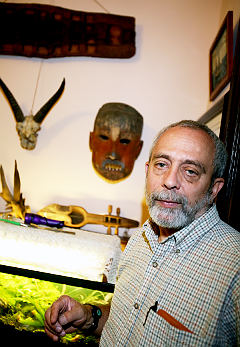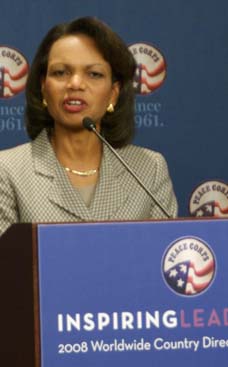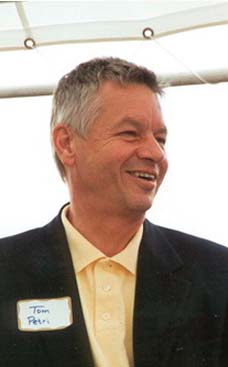
Like many '60s era youth, Wendroff answered the fallen President's call and enlisted in the Peace Corps in 1965. It didn't work out. Wendroff went to Hawaii for training - and was promptly drummed out, along with several colleagues. "They said I had a negative personality and an inability to relate to people," he said. He reapplied the following year, and was allowed back in the program, and this time he headed to Tanzania. But the Tanzanian government closed its borders to Peace Corps volunteers, and he ended up in Malawi. Wendroff spent 1967 and 1968 there, first teaching science and then helping to develop a science curriculum. He also was doing research on his Malawi experiences that on his return home in 1969 would earn him a master's in primary education from Brooklyn College. During several trips to Malawi in the mid '70s, Wendroff met the men - mostly men, anyway - who provided the majority of medical care in the country: Herbalists, called ngangas, who practiced mostly traditional medicine, and nchimis, or witch finders, who dealt with people who believed what was wrong with them was not natural. "Many diagnoses were attributed to sorcery," Wendroff said. "Sorcery was the most prevalent belief, that you got sick because someone was jealous of you, or some spirit or ancestral spirit was angry."
Malawi RPCV Arnold Wendroff has brought to light the dangerous ritual use of mercury
Arnold Wendroff brings to light ritual use of mercury
Friday, May 30th 2008, 4:00 AM
Arnold Wendroff has brought to light the dangerous ritual use of mercury Siesel for News
Arnold Wendroff has brought to light the dangerous ritual use of mercury
The Peace Corps was very good for Arnold Wendroff - the second time around.
The first time didn't work out so well.
Much of what Wendroff, 66, has done in his life started with his time in the Peace Corps, the 47-year-old organization charged by President John F. Kennedy to promote world peace through voluntary humanitarian service in developing countries.
His time in the Peace Corps helped Wendroff get his doctorate in medical sociology from Brooklyn College.
Wendroff's doctoral dissertation, on the relationship between traditional medicine and sorcery, prepared him for a campaign he undertook in New York City from 1989 through 2002 to detail the potentially harmful effects of the liquid mercury that was being used in ritualistic practices in local homes.
Once - and Wendroff suspects, still - sold as "azogue" in capsule form over the counter in local botanicas, mercury is often sprinkled on home and apartment floors as a talisman to bring good luck and ward off evil.
Exposure to vapors of the chemical form of mercury - thermometers contain the elemental form - can affect neurological development in infants.
Possible effects hang on a variety of factors, including the form of mercury, the dose, the age of the person, duration and nature of exposure, and the person's general health before exposure, according to the U.S. Environmental Protection Agency Web site on mercury (www.epa.gov/mercury).
Wendroff's time in Africa also prompted him to found the Malawi Handcart Project, which makes lightweight, low-cost handcarts for distribution to small businesses in southeastern Africa.
Among the wonderful art in his Park Slope, Brooklyn, home, Wendroff has a photograph of several African women walking down a road with large bundles perfectly balanced on their heads.
Behind them is a roadside billboard touting Malawi businesses.
"You can't have a real economy moving goods on people's heads," Wendroff said. The handcart project won a national Malawian award in 2004.
Wendroff was born in Brooklyn near the Parade Grounds south of Prospect Park, and grew up in Flatbush. He went to Erasmus Hall High School and Brooklyn College.
Like many '60s era youth, Wendroff answered the fallen President's call and enlisted in the Peace Corps in 1965.
It didn't work out. Wendroff went to Hawaii for training - and was promptly drummed out, along with several colleagues.
"They said I had a negative personality and an inability to relate to people," he said.
He reapplied the following year, and was allowed back in the program, and this time he headed to Tanzania
But the Tanzanian government closed its borders to Peace Corps volunteers, and he ended up in Malawi.
Wendroff spent 1967 and 1968 there, first teaching science and then helping to develop a science curriculum.
He also was doing research on his Malawi experiences that on his return home in 1969 would earn him a master's in primary education from Brooklyn College.
During several trips to Malawi in the mid '70s, Wendroff met the men - mostly men, anyway - who provided the majority of medical care in the country: Herbalists, called ngangas, who practiced mostly traditional medicine, and nchimis, or witch finders, who dealt with people who believed what was wrong with them was not natural.
"Many diagnoses were attributed to sorcery," Wendroff said. "Sorcery was the most prevalent belief, that you got sick because someone was jealous of you, or some spirit or ancestral spirit was angry."
Wendroff was visiting one prominent nchimi when it struck him to ask the man if he could see the letters people brought him.
"They came back with with several termite-riddled cardboard boxes containing hundreds of letters," he said. "I realized then and there that that was my doctorate dissertation sitting in those boxes."
Wendroff would return to Malawi for several years collecting nchimi letters from several practitioners. He would earn his medical sociology doctorate from Brooklyn College in 1985, based on some 30,000 letters he collected.
Wendroff was teaching science at William Alexander Middle School in Brooklyn in June 1989 when he held a vial of mercury up in class and asked if anyone knew what it was used for.
"One kid said, 'Yes, my mother uses it in Santeria,'" Wendroff recalled. "I said, 'What does she do with it?' He said, 'She sprinkles it on the floor to keep away witches.'"
The student said his mother got the mercury at a shop down the street. Wendroff gave him some money, and the child returned with vials of mercury the next day.
Wendroff visited the botanica himself, then took his findings to local health officials.
No one, he said, wanted to know.
"That was the weird thing," Wendroff said. "The city Health Department didn't know what it was being used for, but they knew it was being sold."
He found that there were no prohibitions against selling mercury. Though highly toxic, it only needed to have an identifying label and a warning label to be in compliance with city laws.
You can read more about Wendroff's mercury findings at www.mercurypoisoningproject.org. The site also includes links to his handcart project.
crichardson@nydailynews.com









